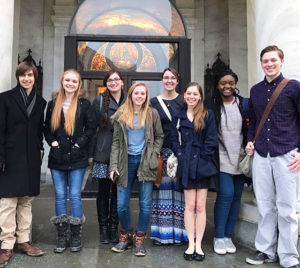“We go because Jesus Christ is present,” explained Honus Wagner ‘20, who spends his Sunday evenings in the basement of the Wesley Chapel. A student’s time is valuable, especially when relationships have grown tense and coursework heavy as the semester hits its halfway point. But every Sunday at six, you’ll find a group of students setting aside an hour of their busy lives to be still, to be together, and to be with God.
 Three years ago, Wagner was a student at the conservative Charles Finney School, a Protestant high school in Rochester. But as of September 12, he stands as the President of a newly christened Houghton club called Catholics on Campus.
Three years ago, Wagner was a student at the conservative Charles Finney School, a Protestant high school in Rochester. But as of September 12, he stands as the President of a newly christened Houghton club called Catholics on Campus.
Catholic students at Houghton college have come a long way. Elizabeth Clark ‘18 recalled that in her early days at Houghton, it felt like she and the only two other Catholic students she knew were “standing alone.” Clark doesn’t want any of them to experience the isolation she had. “It was always sad for us,” she said, “when we really craved that Catholic community outside of just church.”
Catholics on Campus provides that sense of community. They hold weekly meetings and Sunday Vesper services to pray together and discuss their faith, and over seventy students have joined their mailing list.
Andrew Schulz ‘20, a lifelong parishioner of the North American Baptist conference, reflects that faith is “the main conversation piece on campus” at Houghton. For denominational minorities, these constant conversations often reveal the “lack of understanding” they feel the majority has of their traditions. Lutherans, Episcopalians, and Roman Catholics join Houghton at one-fifth of the rate of other colleges, and among students “obsessed with what church you go to and what denomination you identify as,” said Libby Best ‘20, a Lutheran. It’s difficult to avoid confrontation with negative messages about these liturgical traditions. Peers have regularly called her baptism invalid (Lutherans practice infant baptism) and told her that she’s “not a proper Christian.” For Catholic students facing similar confrontations, Best said, “it seems like they just really want a place to be themselves.”
“I think it’s very brave of them to stand up and say ‘this is what we believe,’” said Best. But while they’re glad to educate others, spiritual growth together is the priority: “We’re learning too,” said Clark. Wagner agreed, affirming that the main goal of the group is to “stay spiritually healthy.”
Their shared devotion has led to a strong sense of community in the group. “We have a unique bond of faith,” said Wagner. They worship together with liturgical practices such as group prayers, and experiencing God together as a community only strengthens this bond. “That’s why it’s called liturgy,” explained Wagner: “It’s ‘the work of the people.’
Catholics on Campus welcomes and includes anyone who wants to share in this work. Students of a variety of denominations have participated in their Sunday night Vesper services, and several of these Protestant students have become regular participants. Wagner finds that many church services today lack the mindfulness and prayerful atmosphere that allows him to connect to God – and he believes that the time-tested traditions of the Catholic Church can provide the connection that churchgoers are missing.
Liturgical prayer can be intimidating for those who aren’t used to this type of participant worship: “I feel like I’m going to do something wrong,” explained Schulz, “Like I’m going to mess up the words.” “I completely relate to being lost, too, because I was definitely lost,” said Clark, who was confirmed two years ago. She laughed before adding: “I still get lost sometimes.” While you may be conscious of your stumbling at first, Wagner agreed, you’ll eventually realize that “really nobody cares” about mistakes, and you’ll be able to slow down and focus on the prayer. “It’s a very human experience,” Clark stated.
When Steve Dunmire spoke in chapel this past September, he told students that “in a world that never stops moving, rest is a radical rebellion.” If you find yourself in the basement of the Chapel on a Sunday night, you won’t find the clamor of a crowd or the glare of stage lights—just a quiet group of students sitting together, praying their ancient liturgy in the soft light of their little room. You won’t be watching a performance, but you’ll be a part of the work. You won’t be spoken at, you’ll be speaking with. It’s quiet. It’s thoughtful. It’s different —and it might be just the kind of rest we’re longing for.
